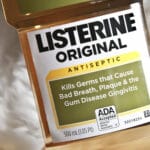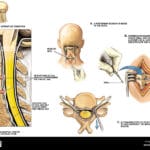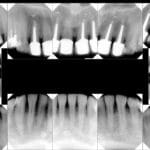Got a throbbing toothache? You might be tempted to try anything for relief, even considering if Listerine can kill the nerve causing the pain. Let’s clear this up: Listerine can’t kill a tooth nerve. While it freshens breath and helps with gingivitis, it’s no match for deep-seated dental problems. We’ll explore the science behind this myth, the real causes of tooth nerve pain, and what you should do instead.
Listerine and Tooth Nerves: Debunking the Myth
The idea of Listerine eliminating tooth nerve pain is a misconception. Think of Listerine as a surface cleaner for your mouth. It tackles bacteria that cause plaque and gingivitis, but it lacks the power to reach the nerves protected within your teeth.
That Burning Sensation: What It Really Means
That tingling or burning you feel when using Listerine isn’t a sign of it working on your tooth nerves. It’s simply the alcohol and other ingredients irritating your mouth’s soft tissues. This sensation might create a false impression of effectiveness, but it’s superficial and doesn’t affect the nerves inside your teeth.
Why the Myth Persists
Some people report temporary pain relief after using Listerine, likely due to reduced gum inflammation around the tooth. It’s like cleaning a wound – it improves the surrounding environment but doesn’t fix the underlying injury. The placebo effect, where belief in a treatment leads to perceived relief, might also play a role.
Understanding Tooth Nerve Pain
What Really Kills a Tooth Nerve?
Several factors can lead to tooth nerve damage and death:
- Bacterial Infections: Often originating from untreated cavities, bacterial infections can reach the tooth’s pulp, where the nerve resides.
- Physical Trauma: A cracked or chipped tooth can expose the nerve to bacteria and other irritants.
- Deep Decay: Advanced decay can penetrate the protective layers of the tooth, reaching and damaging the nerve.
- Progression and Complications: Ignoring these issues can lead to abscesses, bone loss, and potentially the spread of infection.
Finding the Right Relief
If you’re experiencing tooth nerve pain, see a dentist immediately. They can diagnose the cause and recommend the best course of action, which might include:
- Root Canal: A procedure to remove the damaged nerve and save the tooth.
- Extraction: Removal of the tooth if it can’t be saved.
- Antibiotics: If the pain stems from a bacterial infection.
Temporary Relief Options
While waiting for your dental appointment, you can manage pain with:
- Over-the-Counter Pain Relievers: Ibuprofen (Advil, Motrin) or acetaminophen (Tylenol) can help.
- Clove Oil: This natural remedy contains eugenol, a numbing agent. Apply it carefully to the affected area for temporary relief.
Is your tooth throbbing with a rhythmic ache that just won’t quit? Learn more about toothache pulsing and find some potential relief.
Does Listerine Help Tooth Nerve Pain?
Experiencing a throbbing toothache often leads to the question: Can Listerine provide relief? Let’s explore what Listerine can and can’t do for tooth nerve pain. Remember, a toothache is a sign that something’s wrong and shouldn’t be ignored.
Listerine: Fact vs. Fiction
Listerine effectively fights germs causing bad breath and gum disease. However, its effect on tooth nerve pain is limited. It’s like tending a lawn (your gums) but being unable to fix the plumbing inside your house (the inner workings of your tooth).
The Illusion of Relief
Listerine’s alcohol content can create a temporary numbing sensation. However, this only affects the gums, not the nerve deep within the tooth. It might feel soothing, but it doesn’t address the underlying problem.
Addressing the Root Cause
Tooth nerve pain usually stems from issues within the tooth itself:
- Infection: Bacterial invasion of the tooth’s pulp.
- Decay (Cavity): Damage to the tooth structure.
- Fracture: A crack, sometimes invisible, can expose the nerve.
Ignoring these issues can lead to serious complications.
Seeking Professional Help
For true relief, a dental evaluation is essential. Your dentist can diagnose the cause and recommend treatment ranging from a filling to a root canal. While root canals might seem daunting, they’re often the best way to save a tooth.
Temporary Comfort Measures
While awaiting your appointment, manage discomfort with:
- Warm Salt Water Rinse: Soothes inflammation.
- Over-the-Counter Pain Relievers: Ibuprofen or acetaminophen can dull the pain.
These are temporary fixes; they don’t solve the underlying problem.
Ongoing Research
While current evidence suggests Listerine doesn’t directly treat tooth nerve pain, research continues in dental therapeutics, including natural remedies and nerve regeneration. Stay informed, but always consult your dentist before trying new treatments.
Proceed with Caution
Be wary of online advice and home remedies. While some may offer temporary relief, they might mask underlying problems. Your dentist is your best resource for accurate information and personalized care.
Can Mouthwash Kill a Tooth Infection?
Let’s address the common question: Can mouthwash conquer a tooth infection? The short answer is no. While beneficial for oral hygiene, mouthwash can’t reach the core of a tooth infection. It’s like trying to put out a house fire by spraying water on the front door – you need to get inside to tackle the source.
A tooth infection, often an abscess, is a pocket of pus deep within your tooth. Bacteria bypass the tooth’s defenses (enamel and dentin) and reach the pulp, causing inflammation and pain. The infection is trapped inside.
The burning sensation from some mouthwashes might feel like the infection is being eradicated, but it’s only the antiseptic interacting with surface tissues. It kills some bacteria, benefiting overall oral hygiene, but doesn’t address the root problem.
Some mouthwashes contain pain relievers, offering temporary numbness. But this only masks the pain, like a bandage on a broken bone.
Even prescription mouthwashes with chlorhexidine, a potent antiseptic, can’t penetrate deep enough. It’s like cleaning an apple’s exterior – it removes some grime but doesn’t address potential issues inside.
Relying solely on mouthwash for a tooth infection is dangerous. The infection can worsen, leading to complications. See your dentist promptly for a proper diagnosis and treatment, such as antibiotics or a root canal.
Mouthwash is valuable for oral hygiene. It helps control bacteria, freshens breath, and prevents gum disease, which can make teeth more vulnerable to infection. Think of it as a supporting player, not the star quarterback. You need your dentist to handle the tough infections.
| Mouthwash Use | Effectiveness Against Tooth Infection |
|---|---|
| Killing surface bacteria | Yes |
| Freshening breath | Yes |
| Preventing gum disease | Helps |
| Eliminating a tooth infection | No |
| Penetrating tooth enamel to kill infection | No |
If you have a toothache, seek professional help. Mouthwash might offer temporary relief, but only your dentist can treat the infection. Prevention is crucial. Regular dental checkups, brushing, flossing, and using mouthwash are the best ways to maintain a healthy, infection-free smile.
Will Peroxide Kill a Tooth Infection?
A throbbing toothache often leads to exploring home remedies, like hydrogen peroxide. But is it effective against a tooth infection? Let’s investigate.
Understanding Tooth Infections
A tooth infection is a serious issue. Bacteria invade the tooth’s pulp, housing nerves and blood vessels. Untreated, this can lead to severe pain, abscesses, and even the infection spreading beyond the mouth.
Hydrogen Peroxide: A Temporary Reprieve?
Hydrogen peroxide’s bubbling action results from oxygen release, which can disrupt bacterial activity. It may offer temporary pain relief, but this is a truce, not a victory.
Hydrogen peroxide can’t penetrate the tooth to eliminate the infection’s source. Furthermore, applying it to an exposed nerve can worsen pain. While a diluted solution (around 3%) might offer fleeting relief, avoid stronger concentrations, as they can harm oral tissues.
Listerine: A Supporter, Not a Solution
Listerine, an antiseptic mouthwash, controls bacterial growth and freshens breath. However, like hydrogen peroxide, it can’t reach a tooth infection’s core. It’s part of a good routine but can’t replace professional treatment.
Professional Help is Essential
Hydrogen peroxide will not cure a tooth infection. It might temporarily relieve pain, but it won’t address the underlying issue. Only a dentist can diagnose and treat the infection, possibly with a root canal, extraction, or antibiotics. Delaying treatment can lead to significant complications.
Managing Tooth Pain
While waiting for your dental appointment:
- Saltwater Rinses: Soothe inflammation.
- Cold Compresses: Numb the area and reduce swelling.
- Over-the-Counter Pain Relievers: Ibuprofen or acetaminophen can help.
- Clove Oil: Has anesthetic properties but use with caution.
Important: Never use bleach or other harsh chemicals in your mouth.
Preventing tooth infections through good oral hygiene, regular brushing, flossing, and dental checkups is always the best approach.
Disclaimer: This article is for informational purposes only and doesn’t substitute professional medical advice. Consult your dentist for any health concerns.
- Discover Long Black Pepper: Flavor & Health Benefits - April 25, 2025
- Shocking Twists: The Grownup Review: Unreliable Narration - April 25, 2025
- A Quiet Place Book vs Movie: A Deep Dive - April 25, 2025















